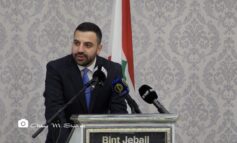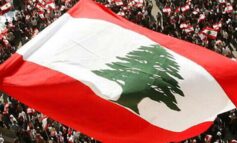




BEIRUT (IPS) — The pages of Lebanon’s history are drenched in blood. And, more than 30 years after the start of the 1975 civil war, Lebanese factions are still pitted against each other in a confrontation with a recurring sectarian dimension amidst a volatile regional context.
Faces have aged, but the protagonists are still the same. Can Lebanon’s “lords of war” avoid the pitfalls of violence and strike a new peace?
Samir Geagea, Walid Joumblat, Nabih Berri, Michel Aoun and Hassan Nasrallah are among the many political figures who rose from the rubble of the Lebanese civil war. Whether they directly or indirectly took part in combat, freely or involuntarily, they lived to shape the future of contemporary Lebanon.
The conflict, which lasted from 1975 to 1990, was the scene of many grisly battles and bloody crimes. Although casualty figures are disputed, according to a study by Aida Kanafani-Zahar, a researcher at the French CNRS — Groupe de Sociologie des Religions et de la Laďcité (Group for Sociology, Religion and Secularism) — the death toll during the war amounted to 150,000, with 350,000 injured.
The conflict saw many gory massacres, which fueled sectarian sentiments. “Lebanon witnessed a series of fights among brothers, with communities rivaling one another for power,” says Emile Khouri, a journalist with the Arabic daily An Nahar, who has closely monitored Lebanese politics for more than 30 years. “Many massacres were often fueled by popular outbursts or in reprisal for spiraling waves of terror.” He says all participants made mistakes.
Many were killed during the “War of the Mountains” between the Druze and Christian communities in 1982 and 1983. Some 130 Druze were killed in the villages of Kfarmata, Obey and Benay, according Kanafani-Zahar, while around 50 Christians were killed in same areas, and their homes burnt down.
This was about the same time when 850 Palestinian men, women and children were systematically gunned down at the Sabra and Chatila refugee camps at the hands of the Lebanese Forces (LF), under Israel’s watchful eye.
Subsequently, conflict erupted in Beirut between the Druze Progressive Socialist Party (PSP) and AMAL — a Shi’a movement headed by Nabih Berri, the current Speaker of the House — leading to many civilian casualties, although exact figures are unavailable. AMAL also carried out a long, violent campaign against Palestinian refugees in what was dubbed the “War of the Camps.”
The lines of divide became increasingly blurred as internecine wars ignited within communities. AMAL and Hizbullah (then an emerging Shi’a militia) clashed in Iqlilm al-Tofah in 1988. The two factions also battled it out along the outskirts of Beirut for control of the capital, which forced Syrian military intervention.
The Christians also had their fraternal wars. The “War of Cancellation,” or Ilghaa, pitted General Michel Aoun — who was at the time head of the Lebanese army and is currently leader of the Free Patriotic movement (FPM) — against Samir Geagea, head of the LF.
Hilal Khashan, head of the political studies department at the American University of Beirut, believes that the erosion of Christian power taking place today can be partly attributed to the conflict between Geagea and Aoun during the war.
“The Maronites in Lebanon went from playing a prominent role to a secondary one. This explains the reasons behind their present day alliances: the FPM feels the need to ally itself with Hizbullah, while the LF are aligned with the Future Movement headed by Sunni MP Saad Hariri (son of slain former prime minister Rafik Hariri),” says Khashan.
The War of Cancellation led to the demise of hundreds of mostly Christian civilians. “Brothers from the same family but on opposing sides would often fight against each other,” says Khouri. This bloody chapter in the civil war was closely followed by another that was as violent and deadly — the War of Liberation — which was led by General Aoun against the Syrian army in 1990.
“Aoun intended to free Lebanon from Syrian domination, which was essentially a just cause. But, the political context of the first Gulf War was such that the Americans granted Syria a mandate on Lebanon for its full support in its war against Iraq, making the balance of power unfavorable to Aoun,” says Khouri. “This strategic mistake caused the death of scores of civilians as well as about 300 soldiers, who were gunned down during the invasion of the Baabda Palace, where Aoun was in residence until he fled.”
Other political factions and their leaders also faced serious obstacles.
After the assassination of his father Kamal Joumblat, current MP and head of the PSP, rose to power. “Walid Joumblat was able to maintain his father’s legacy, which was built on the survival of the community and its cohesiveness. This may explain his constantly shifting alliances.
“One should remember that in the mind of a survivor, there are no permanent alliances but permanent interests,” says Khashan, who believes that Joumblat has been successful in keeping the Druze at the center of Lebanese politics in spite of their lack of demographic weight. The Druze population in Lebanon is estimated to be 280,000 to 350,000, in a nation of four million.
Hizbullah leader Hassan Nasrallah came of age in the eighties, when Hizbullah started appearing on the Lebanese political scene. The party is accused of masterminding the 1983 attack on the U.S. embassy in Beirut, leading to the death of 63 people, and it is linked to the twin truck bombings of French and U.S. army barracks the same year, killing more than 300 people.
“Hizbullah was very successful in branding itself as a resistance movement — which is credited with causing the withdrawal of the Israeli army in 2000 — but made the mistake of turning his attention on to the political interior,” says Khouri, referring to the current political deadlock between Hizbullah and the FPM on one side and the majority coalition of the PSP, LF and Future Movement on the other.
A recent Hizbullah blunder was the kidnapping in July 2006 of two Israeli soldiers, which led to a 33-day war that saw 1,200 deaths, the displacement of a quarter of Lebanon’s population, and more than 3 billion dollars worth of direct losses.
With so many feuds and killings blotting Lebanon’s history, many believe that little hope remains, especially as the “lords of war” seemingly inch closer towards violence instead of peace.
“Two politicians strike me as the most capable of making peace: Joumblat, because of his survivor’s instinct he perceives peace in his community’s best interest, and Berri, because he is extremely adaptive — he has, after all, been able to morph into the role of the head of parliament,” says Khashan. Nasrallah’s Manichean view of the world — based on the belief that war is the only means for good to prevail over evil — makes him an unlikely architect of peace, according to Khashan.
For Khouri, the frame of mind of militia and military men is vital. “People who have actively participated in a war will tend to solve their conflicts on the street, usually away from parliament — which in Lebanon, has been closed for over a year now,” he says.
Dr. Aimee Karam, a clinical psychologist, published a study in 2006 on the failure of national negotiation in Lebanon, in which she acknowledges that most “lords of war” belong to a special breed of people. “They (militia men and military) view conflict as a way to acquire absolute power, which is in reality quite difficult to achieve,” she says.
Karam underlines that one positive sign of the current conflict is that the elements required for starting a war are not present on both sides of the divide. During her interviews with members of the various political coalitions, she observed that sentiments of anger and being victimized as well as the adoption of a cause and ideology, essential components to causing a war, were apparent in one group alone. “The other faction has waged its civil war and managed to grasp its real meaning; it has emerged, therefore, with a more pragmatic approach,” she says.
Whether or not war will once again sully the shores of Lebanon is uncertain, but flashbacks of the country’s violent past are re-emerging with more intensity. Mussolini once said, “Blood alone moves the wheels of history.” It seems that, for the time being, those wheels have stalled in Lebanon.





Leave a Reply